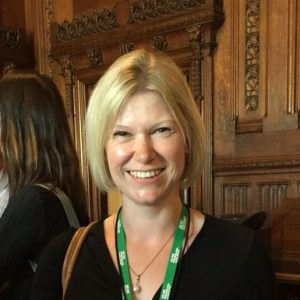Dr Emma Whitehouse (1998, Physiological Studies) shares her view from the frontline of the pandemic and how GPs have responded to the outbreak while continuing to supply vital primary care.
I work in leafy Surrey with a practice population that includes both affluent and deprived areas, as well as a high proportion of care home residents. Prior to the COVID19 pandemic, we were very busy with routine waits for a GP appointment sitting around 14 days (in line with national averages) and high volumes of calls for urgent on-the-day care from our multidisciplinary in-house urgent care team. Stats from the RCGP, long before COVID 19, advised that 90% of all patient contacts with the NHS happen in primary care and the majority of these were face to face.
Overnight, COVID19 changed the face of general practice. I have never experienced a time where new guidelines, standard operating procedures, national asks of primary care and internal processes have been so rapidly written, revised, torn up and re-written. These were arriving thick and fast from national teams, local ICS teams, primary care networks and also being driven within our own practice adapting our own internal policies and processes based on our practice population and staffing cohort.
It was frantic and exhausting but some excellent results appeared. We moved general practice to an almost total digital, triage first model by utilising electronic, telephone and video consultations.
The updates were so extensive we needed to have twice daily multidisciplinary team meetings to keep up. Work was shared out daily at these meetings so everyone took their turn processing our new ways of contacting patients from routine and triage calls, video consultations, virtual nursing home ward rounds and home visits and electronic consultations.
The team spirit that emerged from this was like never before. It was a particular joy to eat lunch together, rather than in front of our computer screens as was the case pre-COVID19! We were working together like a well oiled machine.
So what about the patients? Initially, patients were worried about approaching their GP for fear of overwhelming us during the pandemic, but slowly more and more started to adapt to the new ways of interacting with us. They were getting responses to their queries faster than ever before; adapting to new digital ways of working including video consultations whilst in their gardens or even out walking in the woods. They were also learning to self care appropriately – most importantly by utilising 111 or the NHS website before contacting us.
But we still have anxieties around those who are delaying giving us a call, particularly those with symptoms of possible cancer. We fully support the important national message that the NHS is open for everyone, and not just those with COVID19.
Will we go back to ‘normal’ when this pandemic settles? The answer is no. We have travelled so far in such a short period of time, and we want to hold on to a lot of the new ways of working even when the outbreak is over.
For now, containing the virus remains paramount – but we also need to ensure that the core principles of holistic general practice do not get lost along the way.
